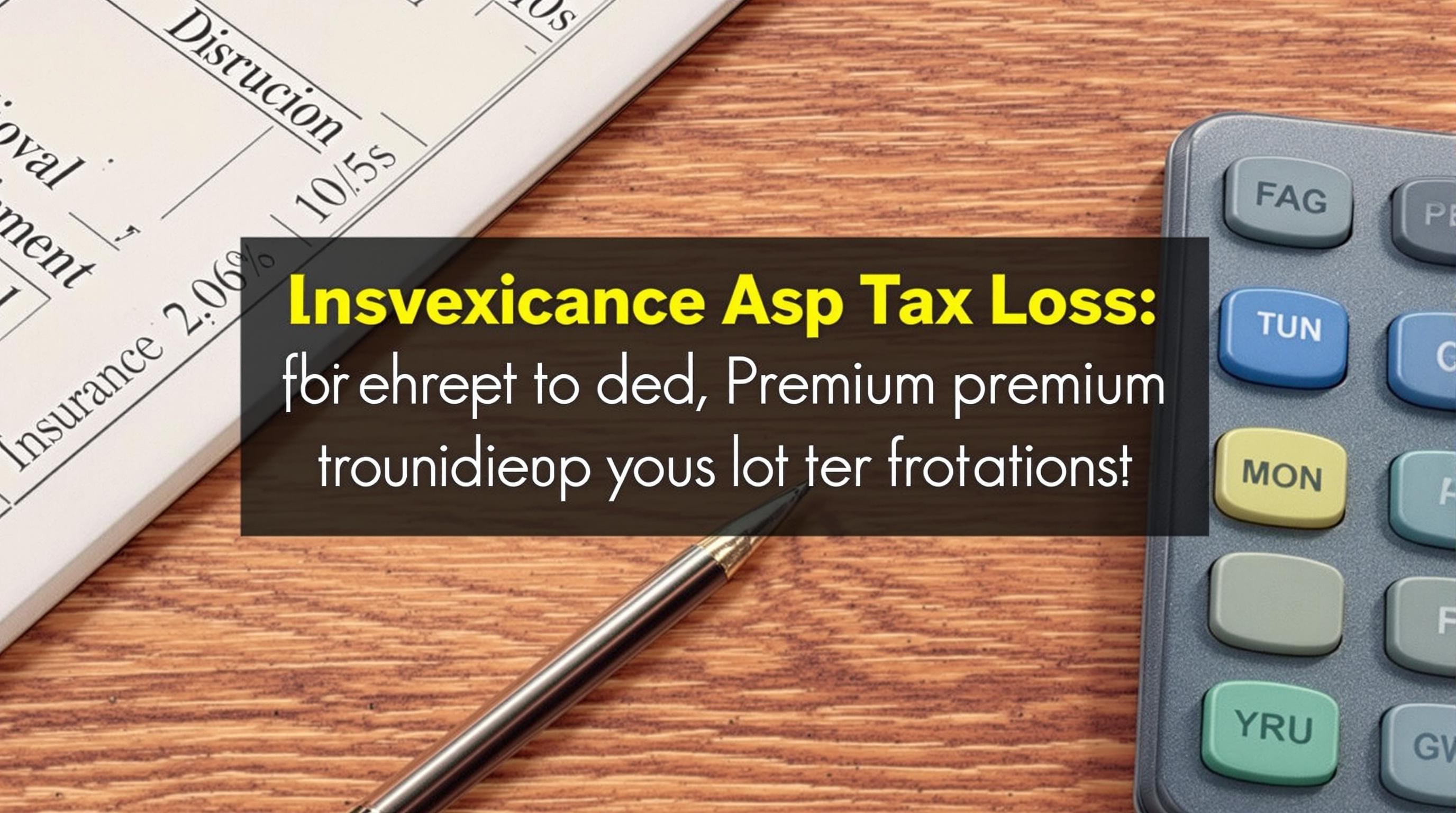Related Articles
- Top 7 Game-Changing Riders Released Since 2019 That Redefine How You Customize Your Life Insurance Coverage
- Top 5 Game-Changing Insurance Add-Ons from the Past Five Years Redefining Rider Benefits and Coverage
- The Silent Impact of Guaranteed Issue Insurance on Elderly Mental Health and Community Social Networks
- Top 6 Emerging Simplified Issue Policies Since 2019 That Redefine Risk and Flexibility for Modern Buyers
- How Changing Remittance Intervals Influence Insurer-Provider Partnerships in Healthcare Coordination
- How Seasonal Spending Cycles Secretly Shape Insurance Premium Timing and Consumer Choices
8 Unexpected Insurance Tax Traps Impacting Business Premium Deductions You Must Avoid in 2024
8 Unexpected Insurance Tax Traps Impacting Business Premium Deductions You Must Avoid in 2024
8 Unexpected Insurance Tax Traps Impacting Business Premium Deductions You Must Avoid in 2024
For businesses navigating the complexities of tax deductions on insurance premiums, 2024 brings new considerations that could significantly impact financial planning. Understanding these unexpected tax traps is crucial to maximize deductions and avoid costly mistakes. This article explores eight key issues every business owner should be aware of.
1. Misclassification of Premiums
Insurance premiums must be correctly classified to qualify for deductions. Premiums paid for employee health insurance generally are deductible, but premiums for certain other types of coverage may not be fully deductible.
For example, premiums for life insurance policies where the business is the beneficiary often have limited or no deduction available. Confusing personal coverage costs with business coverage can lead to disallowed deductions.
Businesses should consult IRS guidelines, such as those detailed in IRS Publication 535, to ensure proper classification and maximize allowable deductions.
2. Overlooking Group Health Plan Requirements
Group health plans offer tax advantages, but failure to comply with specific regulations can jeopardize deductions. Changes in the Affordable Care Act and related tax rules require businesses to maintain compliance throughout the year.
One common trap is neglecting the "minimum value" and "affordability" standards, which can affect whether premiums remain deductible for the employer. Non-compliance may trigger penalties and reduce benefits.
Careful attention to plan design and documentation is essential to maintain eligibility for premium deductions under current law.
3. Deductibility of Disability Insurance Premiums
Disability insurance premiums present unique tax treatment challenges. Generally, premiums paid by the employer for employee disability coverage are deductible, but the tax status of any benefits paid can impact employees’ tax situation.
In some cases, if premiums are paid with after-tax dollars, benefits become tax-free. Conversely, if premiums are paid pretax by the employer, disability benefits may be taxable to employees.
Understanding the distinction and structuring payments accordingly is important to optimize deductions and minimize unexpected tax liabilities.
4. Improper Allocation Between Personal and Business Use
Businesses that pay for insurance covering both personal and business use must allocate premiums appropriately. For instance, if a company vehicle is insured and used for both personal and business purposes, only the portion attributable to business use is deductible.
Failing to allocate expenses accurately can result in IRS audits and disallowed deductions. Maintaining detailed usage records and proper cost allocation methods is critical.
IRS guidelines encourage businesses to treat insurance premium deductions with the same rigor applied to other mixed-use assets to avoid disputes.
5. Self-Employed Health Insurance Deduction Nuances
Self-employed individuals often face challenges distinguishing between business and personal health insurance premium deductions. While self-employed health insurance premiums are generally deductible, timing and reporting requirements are strict.
Premiums paid through a business account but reimbursed personally may cause deduction conflicts or double-counting. Additionally, premiums must be reported on specific tax forms such as Schedule 1 of Form 1040.
Staying aligned with IRS Publication 535 and working with tax professionals can help self-employed taxpayers maximize their deductions legally.
6. Limitations on Life Insurance Premium Deductions
Life insurance premiums paid by a business may not always be deductible, especially when the business is directly or indirectly a beneficiary. The IRS strictly limits deductions to avoid abuse of life insurance policies as tax shelters.
Policies that benefit key employees or owners need careful structuring to qualify for deductions. Premiums for "split-dollar" arrangements or policies mainly serving estate planning typically are nondeductible.
Tax codes under IRC Section 264 provide clear rules; knowledge of these is critical for businesses using life insurance as part of their benefits or compensation packages.
7. Failure to Adjust Deductions for Premium Refunds
Businesses receiving premium refunds, commonly known as dividends or rebates from insurers, must adjust their deductions accordingly. Failure to reduce the deductible amount by refunded premiums can cause errors on tax returns.
These refunds often occur with mutual insurance companies or after lossless periods. They must be accounted for in the year received, impacting the current tax deduction.
Maintaining accurate records of premium payments and any refunds is essential to comply with IRS rules and avoid audit triggers.
8. Neglecting State-Specific Tax Rules
State tax laws relating to insurance premium deductions can differ significantly from federal rules. Some states may disallow deductions allowed on federal returns or impose additional restrictions.
For example, California often conforms partially to federal regulations but includes specific modifications affecting the deductibility of certain insurance premiums.
Businesses with multi-state operations should consult both federal and state tax authorities or professionals to ensure full compliance and optimal deductions at all levels.
Conclusion: Awareness of these eight unexpected tax traps related to insurance premium deductions is vital for business owners and financial managers in 2024. Careful planning, proper documentation, and consultation with tax professionals will minimize risks and maximize tax benefits.
Sources:
IRS Publication 535: Business Expenses (https://www.irs.gov/publications/p535)
IRS Instructions for Schedule 1 (Form 1040) (https://www.irs.gov/forms-pubs/about-schedule-1-form-1040)
Internal Revenue Code Section 264 (Life Insurance Premium Restrictions)
State Department of Revenue Websites




